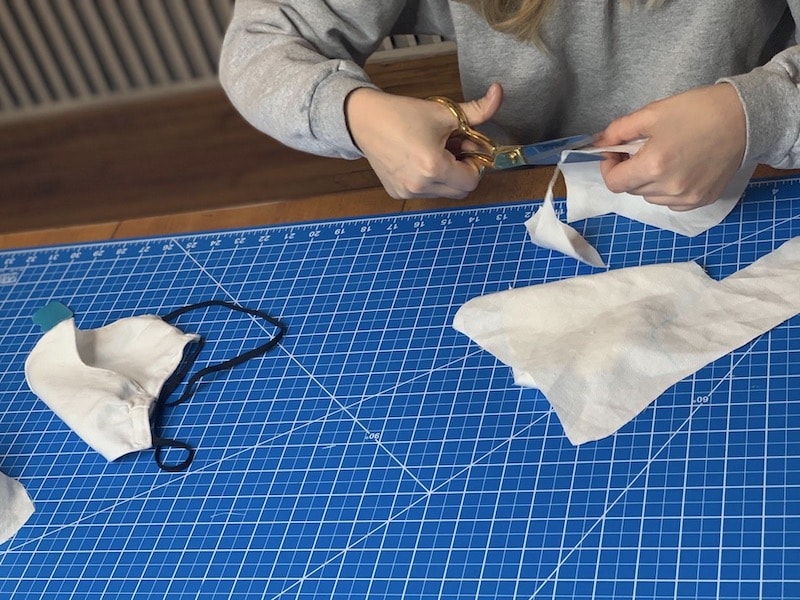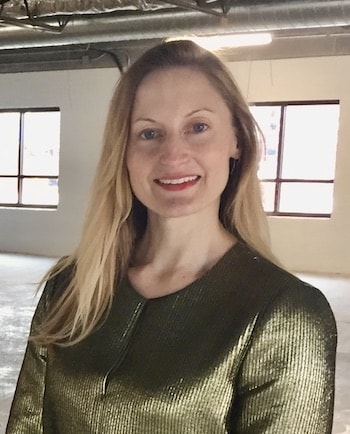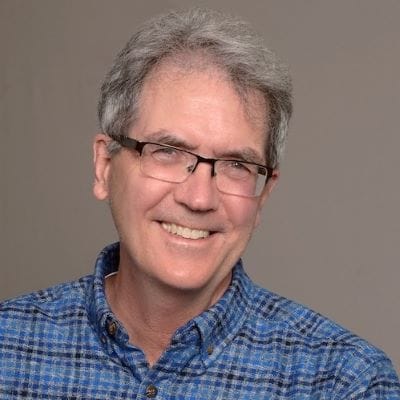Rightfully Sewn Shifts to Producing Fabric Masks to Help Healthcare Workers

Published March 30th, 2020 at 12:15 PM
By Kevin Collison
Rightfully Sewn, the Crossroads workshop for training seamstresses, has shifted from making fashion wear to producing protective masks for healthcare workers encountering shortfalls during the Covid-19 pandemic.
The nonprofit plans to make 20,000 fabric masks based, in part, on a pattern released by the Deaconess Health System of Evansville, Ind.
And while the fabric masks are no substitute for the medical N95 masks in short supply that protect healthcare workers from the virus, they are useful in other ways, including prolonging the life of the N95 or offering a substitute in less hazardous situations.
“The fabric mask will go on top of my N95,” said Dr. Rahul Kapur, a supporter of the Rightfully Sewn project. “If it gets soiled, I can get rid of the fabric mask rather than thrown away my N95.”
Jennifer Lapka, founder and president of Rightfully Sewn, said she reached out to several local hospitals after learning about the Deaconess program.
“North Kansas City already had published a pattern they wanted and the University of Kansas Health System and Truman Hospital said use whatever pattern you want.
“We have enough fabric to make 10,000 masks and our goal is to make 20,000 total.”

Jennifer Lapka
A half-dozen Rightfully Sewn seamstresses are producing the fabric masks. If the project attracts enough donations, more seamstresses can be brought on board and the number of masks produced would be increased.
Dr. Kapur, whose internal medicine practice is affiliated with North Kansas City and Liberty Hospitals, encouraged Lapka to manufacture the fabric masks.
“While fabric masks are not to be used in the care of COVID-19 patients, according to the Center for Disease Control, fabric masks are a crisis response option when other supplies have been exhausted,” he said.
“Fabric masks can also be helpful in other areas of patient care as supplies of personal protection equipment are depleted.”
Fabric masks must use four layers for filtering and need to be adjustable. Depending on how their quality and fit, a fabric mask can be anywhere from half as effective as surgical masks to about the same effectiveness as surgical masks, Dr. Kapur said.
“I am thankful to Jennifer Lapka in her efforts and hope everyone in this community comes together in these tough times,” he said.
Lapka said her seamstresses are working outside the Crossroads facility in response to the city stay-at-home quarantine order.
“Fabric warehouses around the country are closing fro quarantine measure, too, so we need to act fast.
“We will start with fabric already at our atelier, which has been donated by our small-batch production clients such as duoFIT Maternity Activewear.”
To help speed production, Eleve Dancewear also is allowing the seamstresses from Rightfully Sewn to use its industrial equipment in the evenings.
People and organizations interested in supporting the effort can donate here. The Walsh Family Foundation is providing a dollar-for-dollar match for the first $15,000 raised.
Hospitals in need of masks can call 816-491-8136 or email info@rightfullysewn.org.
(Editor’s note: CityScene KC is now a paid subscription publication, please consider subscribing.)


